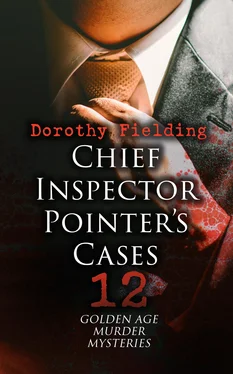Mrs. Erskine told her how pleased she was to see anyone who had known her husband and son in Canada, and asked Christine to stay at the villa for a fortnight. "Though Nice is still quite deserted," she added. Christine suggested that her wardrobe might not be quite up to Nice's standards, but Mrs. Erskine smiled faintly at the idea. She insisted on sending to the station where the luggage had been left, and Marie the maid showed the Canadian, after a delicious tea, into her room.
"We dine at eight o'clock," her hostess had told her. "The other people in the villa are friends of mine, and we have all our meals together. There is a Mr. and Mrs. Clark, who have the ground floor, and are splendid tennis players—you may like to practice with them of a morning—and then there is Major Vaughan, who has the floor above this. He is rather an original, but as an old bachelor, as well as an old friend of my husband's, I humor him."
The room assigned to Christine was very barely furnished. After a bath in a luxurious bathroom, she opened the door next to her own by mistake, and stepped into a really beautiful bedroom, all silver and petunia shades. Closing the door hastily, she raised her eyebrows a little as she stepped on into her own very comfortless nook. Mrs. Erskine might be delighted to see her, but, though she had had ample warning of her coming, she had certainly not been over concerned with her guest's comfort. At dinner, which was of a quality and served with a luxury Christine found a revelation, she met the other inmates of the house. Mr. and Mrs. Clark were a cheery, rather noisy couple, who seemed to consider all life a great joke. Christine decided that the lady had once been on the stage, from her partiality to paint and powder and richly tinted locks, but there was a breezy good nature about her which offset Mrs. Erskine's chilly manner. To Major Vaughan she took an instant aversion. His light eyes stared at her insolently, from the simple hair-dressing to the hem of her equally plain little frock.
"An almost-relation"—he repeated Mrs. Erskine's introduction; "you must adopt us, too, Miss West. We are all one happy family here, you see. Having everything in common." Christine thought she had never seen a more odious smile. She refused to talk to him, but all through the Clarks' chaff she could hear his biting speeches and neighing laugh. Mrs. Erskine's answers were chiefly monosyllabic, and before she joined the others at bridge under the palms and roses on the terrace she turned a rather weary face to the young woman.
"The Major is so brilliantly clever, when he cares to exert himself, that one has to overlook his little moods. After all, we shouldn't live like this if we didn't fit in very well together."
Which was more than Christine did. She sometimes thought it was her guilty conscience, the secret purpose which had brought her to Nice, that the villa seemed an uncomfortable place to her. Wherein lay the discomfort she could not analyze, even for Pointer's benefit. Mrs. Erskine took no interest in the open air life beloved by the Clarks, but lay for the most part on a chaise-lounge. The Canadian girl had heard of Scotch taciturnity, but her hostess was the most reserved person she had ever met. Only point-blank questions would bring out any of the remembrances on which Pointer had built his hopes.
Of her husband she spoke with a certain old-fashioned respect and affection that touched Christine. About Robert as a baby she spoke, too, and equally tenderly, but of his life after he left with his father for Canada, she either had nothing to say, or refused to say it.
"I would rather not discuss my son," she said once in her low, prim voice. "I am thankful that his murderer has been caught, but I dread what revelations the trial may bring to light."
Christine kept silence only by an effort. Rob had been no saint, but neither was his mother perfect. Shortly after her arrival her hostess had suggested that they should drive into Monte Carlo to make some purchases.
"There's a milliner I've heard of who's having a bankrupt sale of stock. I'm told there are really some good bargains to be got."
Christine and she drove down to where they were received by a very pale young woman, with dark shadows under her eyes, who looked as though a square meal would be a novelty. The hats were very moderately priced, indeed. Mrs. Erskine decided on a couple, and then began to dispute the price. Christine marveled as she listened. It was a shabby scene, heightened by the air of triumph with which the Scotswoman turned to Christine when they were again in the car.
"They were bargains anyway, but I felt quite sure that I could get them still cheaper."
"She looked very sad, and so young," Christine said soberly.
"It takes capital to succeed in Monte Carlo," was Mrs. Erskine's rejoinder. Something in her companion's face arrested her attention, "You mustn't think me hard"—Christine did—"but I consider it wrong to spend a larger sum than necessary upon myself. Three-quarters of my income is needed for my charities, and the remaining quarter I consider I should stretch as far as possible."
Christine said nothing for a few minutes.
"It must be very nice to be able to give away so much," she said musingly, "but for that, I don't see that wealth has much to offer. Which is as well"—she turned to Mrs. Erskine with a smile—"as I am never likely to have much of it."
Judging by Mrs. Erskine's face, she did not share Christine's philosophical point of view in the least.
"A gypsy woman read my hand when I was a tiny tot and said that I should die a wealthy woman, and years later I had the same thing told me—that I should die possessed of great wealth."
They drove home in silence. Christine turned over in her mind what she had just learnt as to her hostess's division of her money. At first she was a little skeptical as to its literal truth, but after a week in the villa she took this suspicion back. Mrs. Erskine did live apparently on the scale of one thousand a year. Apart from the villa and its furnishings, which she had evidently purchased years ago, and the motor-car and meals which all the household shared, she spent but little on herself.
Of anything that could help John Carter Christine learnt nothing. Mrs. Erskine, though she had never heard of him before his arrest, now proclaimed his guilt as firmly as though he had already been tried and convicted. There was only one startling fact, after close on a fortnight, which the villa had revealed to Christine, and that was that Mrs. Erskine was afraid of something.
She herself openly alluded to the fact, when discussing a case in the paper, that she slept with a loaded revolver under her pillow.
"Day or night I always have one close at hand, and I'm quite a fair shot."
"In the midst of life we are in death," cackled the Major, who had not shown himself for several days.
Mrs. Erskine looked at him with one of her frosty smiles, but said nothing. It suddenly struck Christine that here might be the reason why Mrs. Erskine kept the Clarks and the Major with her. They were even in the habit, she learnt, of sharing the summer cottage together, yet Christine did not think that Mrs. Erskine cared any more for them in her heart than she did for herself—Christine—whom yet she had asked to extend her visit for at least another fortnight.
Were they all not so much friends as a bodyguard? If so, from what danger were they intended to shield their hostess? She puzzled over the matter greatly. It seemed to her the one point of interest she had unearthed. As for Pointer, he wrote no comment, only that she was to watch every detail closely that came under her notice. True, she remembered Robert saying that his mother was timid, a timidity which he himself had inherited, just as he had her one uneven eyebrow, and also a little mannerism of the wrists which Christine never saw without remembering him with a pang.
Читать дальше












